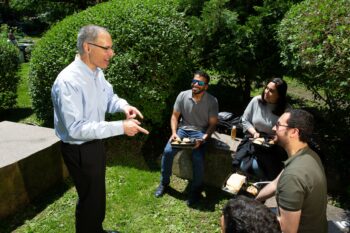The Faculty of Medicine recently welcomed over 230 new residents, starting their McGill postgraduate training at Montreal area hospitals and clinics as well as health care settings across the McGill Réseau Universitaire Intégré de Santé (RUIS). The new residents are embarking on their training to become specialists in Family Medicine, Emergency Care, Pediatrics and Neurology to name just a few of the more than 70 postgraduate medical education programs offered at McGill.
Dr. David Eidelman, Vice-Principal (Health Affairs) and Dean of the Faculty of Medicine welcomed the trainees who hail from Quebec, Canada and around the world during the annual orientation session and lunch held on June 27. “This is an exciting time to be starting residency. Technological advances are revolutionizing patient care and management. Emerging technologies such as artificial intelligence (AI), as an example, will help you make a more accurate diagnosis, enhancing patient care and improving outcomes.” Dr. Eidelman underscored the Faculty’s values of professionalism, which include compassion, integrity and honesty, respect and collaboration, openness, connectedness to our community, and altruism. He urged residents to uphold these values even when the frantic pace of health care delivery has them moving at lightning speed.
Also addressing the group, Dr. Armand Aalamian, Associate Dean, Postgraduate Medical Education (PGME) said, “You are all strong, competent doctors, you wouldn’t be here otherwise. But remember, doctors are not infallible; errors are inevitable. But you must always strive for excellence.”
Some of the new residents will be entering programs that have transitioned to a new approach to postgraduate medical education called Competency-Based Medical Education (CBME). Dr. Evelyn Constantin, PGME Assistant Dean and CBME Lead explained, “CBME is a major step forward in assessment. Each residency program works with the Royal College to develop its unique set of training and assessment requirements – called Entrustable Professional Activities (EPAs). Each EPA includes CanMEDS-based milestones related to different stages of training. The EPAs and milestones lay out a clear learning plan for residents and provide well-defined teaching and assessment goals for educators.” As of July 1 2019, 20 McGill programs have adopted CBME with all programs scheduled to follow suit by 2022.
Dr. Robert Sternszus, Director, Pediatrics Residency Training Program and a member of the Institute of Health Sciences Education led a discussion on professionalism and professional identity. “Residency has been described as one of the most critical times in the development of a physician’s professional identity,” he said. “Residents will have many experiences, interactions and relationships that will shape who they become. It is of utmost importance that they play an active role in this process by reflecting on who they are, where they have come from and who they wish to be.”
As is tradition, a lunch was provided following the orientation session, affording the residents with an opportunity to network and get to know their new colleagues.
Photos : Egan/Dufour
July 16 2019











